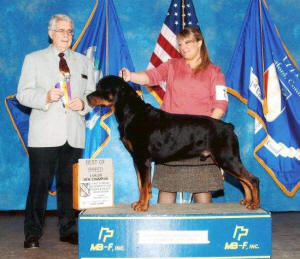Pedigree and Registration
|
Owners of puppies are often misled by sellers with such ruses as leading the owner to believe his dog is something special. The term pedigree papers is quite different from the term registration papers. A pedigree is nothing more than a statement made by the breeder of the dog; and it is written on special pedigree blanks, which are readily available from any pet shop or breed club, with the names of several generations from which the new puppy comes. It records your puppy's ancestry and other important data, such as the pup's date of birth, its breed, its sex, its sire and dam, its breeder's name and address, and so on. If your dog has had purebred champions in his background, then the pedigree papers are valuable as evidence of the good breeding behind your dog; but if the names on the pedigree paper are meaningless, then so is the paper itself. Just because a dog has a pedigree doesn't necessarily mean he is registered with a kennel club. Registration papers from the American Kennel Club or the United Kennel Club in the United States or The Kennel Club of Great Britain attest to the fact that the mother and father of your puppy were purebred dogs of the breed represented by your puppy and that they were registered with a particular club. Normally every registered dog also has a complete pedigree available. Registration papers, which you receive when you buy a puppy, merely enable you to register your puppy. Usually the breeder has registered only the litter, so it is the new owner's responsibility to register and name an individual pup. The papers should be filled out and sent to the appropriate address printed on the application, along with the fee required for the registration. A certificate of registration will then be sent to you. Pedigree and registration, by the way, have nothing to do with licensing, which is a local regulation applying to purebred and mongrel alike. Find out what the local ordinance is in your town or city and how it applies to your dog; then buy a license and keep it on your dog's collar for identification. At long last, the day you have all been waiting for, your new puppy will make its grand entrance into your home. Before you bring your companion to its new residence, however, you must plan carefully for its arrival. Keep in mind that the puppy will need time to adjust to life with a different owner. He may seem a bit apprehensive about the strange surroundings in which he finds himself, having spent the first few weeks of life with his dam and littermates, but in a couple of days, with love and patience on your part, the transition will be complete. First impressions are important, especially from the puppy's point of view, and these may very well set the pattern of his future relationship with you. You must be consistent in the way you handle your pet so that he learns what is expected of him. He must come to trust and respect you as his keeper and master. Provide him with proper care and attention, and you will be rewarded with a loyal companion for many years. Considering the needs of your puppy and planning ahead will surely make the change from his former home to his new one easier. Reference: Rottweilers by Anna Katherine
Nicholas #1 Best Selling Rottweiler Book |

